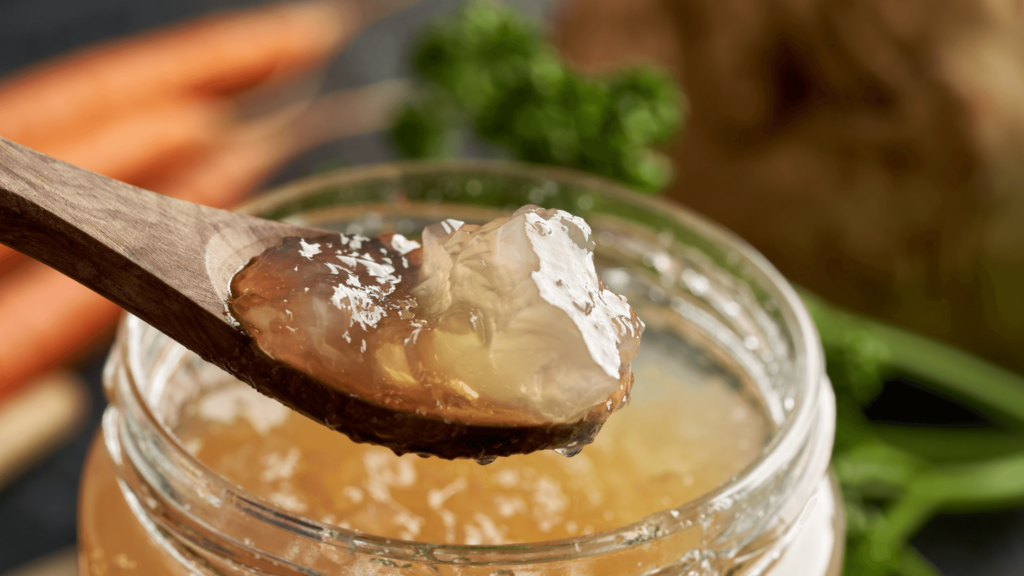You may have noticed collagen peptides popping up as an ingredient in protein powders or being sold on supplement store shelves. As one of the body’s most abundant proteins, collagen provides structure and elasticity to your skin, hair, joints, and tendons. Bone broth is one of the richest sources of food-based collagen, but for plant-based eaters, supplementing with nutrients needed to support collagen production can be beneficial.
Quick look
- Collagen makes up 30% of your body’s total protein and provides structure and elasticity to your skin, hair, joints, and tendons.
- There are 28 types of collagen, but types I-V are the most common.
- Your body can’t absorb collagen in its whole form—breaking it down into collagen peptides allows it to be easily absorbed.
- Collagen peptides can help improve skin tone and elasticity, reduce joint stiffness, build muscle mass, support gut health, and create strong, healthy hair and nails.
- Bone broth is simple to make and a great, bioavailable collagen source.
What is collagen?

Collagen is a structural protein that makes up over 30% of the total protein in the body. It’s critical to creating healthy skin, hair, bones, and muscles. Collagen’s main job is to create strength and support within your body, making skin more elastic and less prone to wrinkles, strengthening bones, providing cushion for joints, and helping support wound healing and tissue growth.
For manual laborers in jobs that place additional stress on their joints, collagen is hugely important.
Collagen is derived from animal sources and is found in the skin and connective tissues of meat, as well as bone broth.
Types of collagen
There are 28 distinct types of collagen, but the most common are types I, II, III, IV, and V.
- Type I: Type I collagen makes up 90% of the collagen in your body. It adds structure to ligaments and tendons, helps make skin more elastic, and reduces sagging and wrinkles.
Type II: Type II collagen exists in your elastic joints and helps support healthy cartilage, joints, and tendons. - Type III: Found in muscles and organs, type III collagen contributes to healthy skin and nails, improved circulation, and better gut health.
- Type IV: The fourth type of collagen is located in your skin’s layers.
Type V: Type V collagen can be found in placental tissue, hair, some layers of your skin, and the cornea of the eye.
Benefits of taking collagen peptides
As you age, your collagen levels naturally decrease. Your body creates less collagen, and the collagen you do have gets broken down faster. Eating too much refined carbohydrates and sugar, smoking, and being exposed to UV light can also contribute to collagen damage.
Decreasing collagen levels can cause wrinkled skin, joint pain, stiffness, and more. But here’s the thing: your body can’t absorb collagen in its whole form. When you eat collagen-containing food sources, your body breaks it down into amino acids, supporting collagen production.
Similarly, collagen peptide supplements aren’t made of collagen in its whole form. Rather, they contain smaller amino acids called collagen peptides sourced from the tissues of cows, chickens, fish, or pigs.
Supplements containing collagen peptides or hydrolyzed collagen are absorbed by your digestive system. They may prevent and even reverse some of the effects of collagen loss, creating healthier skin, muscles, joints, and more.
Skin health
A review of 26 studies showed that daily hydrolyzed collagen supplements “significantly improved skin hydration and elasticity.” Paired with sunscreen and a healthy diet, collagen supplements can be a great addition to your skincare routine. (And if you don’t have one yet, now is a great time to start!)
Joints and bones
Jobs involving manual labor are far from easy on the body, and joint pain and discomfort are typically two of the most common complaints among field workers. While some experts hesitate to recommend collagen supplements for joint pain, several studies show promising results.
In a clinical trial examining the effects of Type II collagen supplementation, participants reported feeling less pain and morning stiffness and fewer swollen and tender joints. Another small study showed that collagen supplements may benefit patients with osteoarthritis.
Muscle mass
Collagen supplements may help you avoid losing your muscles and build muscle faster. Collagen has been shown to reduce muscle atrophy in mice, and supplementing with collagen while weight training helps people build more muscle mass than weight training alone.
Gut health
Your gut is much more than just a factory for digesting food. Recent research has shown that this large nerve center constantly communicates and relays information, leading some researchers to call it a “second brain.” Collagen may help support a healthy gut. A small 2022 study showed that 93% of its 40 participants reported reduced bloating and stomach issues after taking collagen for six weeks. Scientists have also found that collagen can repair and strengthen damaged gut barriers.
Healthy hair and nails
Your hair and nails might seem decorative, but they’re also important health and nutrition indicators. Some people are prone to dry hair and brittle nails, but they can also indicate nutritional deficiency or low collagen levels.
Collagen peptides may help. Participants in a 2020 study saw significant improvement in their hair health after their first four weeks of collagen supplementation, including thicker hair, less breakage, and more growth—a major perk for anyone who’s experiencing hair loss. Collagen also helped make nails grow faster and break less often.
For most people, collagen supplements are a wise idea
Collagen production begins to slow down in your 20s for men and women, but women experience a significant drop during menopause. You can support your body’s own collagen production by:
- Limiting sun exposure
- Eating a healthy diet
- Quiting smoking
- Getting enough sleep
- Regular physical activity
But life doesn’t always go as planned. Research into the benefits of collagen peptides is promising and side effects are few. For most people, taking collagen peptides can help cover your nutritional bases and support your body.
Bone broth: an easy and rich source of collagen

Collagen peptides are easy to find online or in most supplement stores, but you can also get all the joint-cushioning, hair-strengthening, wrinkle-reducing benefits of collagen from bone broth.
Bone broth is cheap and simple to make, if a little time-consuming. A slow cooker is a great way to make it without having to watch the stove.
Beef bone broth
With more collagen per serving than chicken bone broth, beef bone broth is best for supporting gut health, mood, and immune system.
Ingredients:
- 3-4 lbs grass-fed beef bones (oxtail, shank and knuckle bones are great)
- 2 carrots, chopped
- 2 celery stalks, chopped
- 1 head garlic cut in half across the bulb
- 1 onion, cut into four pieces
- 1 tablespoon of apple cider vinegar (important to pull minerals from the bones)
- 1 teaspoon sea salt
- 10 cups water (or enough to fill to the max line of your slow cooker, or cover all ingredients in your saucepan)
Directions
- Pre-heat your own to 450° and roast the beef bones for 30-40 minutes, turning once.
- Add the cooked bones and all other ingredients to your slow cooker or saucepan, and add enough water to cover all ingredients.
- Bring to a boil, then cover and let simmer for 12 hours. Check water levels frequently and add more water if necessary. If using a slow cooker, set to low for 24 hours.
- Cool the broth before straining out and discarding the bones and vegetables.
Chicken bone broth
Chicken bone broth supports healthy joints and tendons, and for people who don’t eat beef, is a great alternative to beef bone broth.
Ingredients:
- 3-4 lbs chicken bones (feet, necks, backs, roasted carcass)
- 2 carrots, chopped
- 2 celery stalks, chopped
- 1 head garlic cut in half across the bulb
- 1 onion, cut into four pieces
- 1 teaspoon sea salt
- 10 cups water (or enough to fill to the max line of your slow cooker, or cover all ingredients in your saucepan)
Directions
- Add the bones and all other ingredients to your slow cooker or saucepan, and add enough water to cover all ingredients.
- Bring to a boil, then cover and let simmer for 12 hours. Check water levels frequently and add more water if necessary. If using a slow cooker, set to low for 24 hours.
- Cool the broth before straining out and discarding the bones and vegetables.
Pro tip: To supercharge your broth, use chicken feet. They produce a richly gelatinous broth packed full of nutrients and gelatin. We like to call it chicken broth jello.
Vegetarian sources of collagen
If you follow a plant-based diet, you might wonder about vegan or vegetarian collagen sources. Since collagen peptides are sourced from animal products, there is no true vegan source of collagen. However, many vegan supplements contain ingredients to support your body’s own collagen production, including zinc, glycine, manganese, lysine, copper, vitamin C, and silica.
Marine collagen supplements are also suitable for pescatarians—but we’ll warn you about the taste ahead of time!
Bottom line
As one of your body’s most abundant proteins, collagen adds stretch, structure, and elasticity to your skin, hair, joints, tendons, and muscles. For people working in the field, physical health is just as important as mental health—and your skin, bones, joints, and tendons are a huge part of that.
Taking collagen supplements is an important consideration to maintain an active mind and healthy body, especially as you age. So, if you’re looking to stay limber well into your 80s (even if you’re not planning on being in the field), now’s a better time than ever to get into a routine.




3 comments
binance konta izveide
Your article helped me a lot, is there any more related content? Thanks!